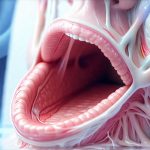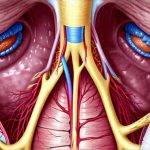Gastroesophageal reflux disease (GERD) is often understood as heartburn and indigestion, but its manifestations can be surprisingly diverse, extending far beyond typical digestive complaints. Many individuals experiencing GERD find themselves perplexed by symptoms that seemingly originate in the sinuses – postnasal drip, chronic congestion, even facial pain. This disconnect between the source of the problem (the esophagus and stomach) and perceived location of symptoms (the nasal passages and face) leads to misdiagnosis and delayed appropriate treatment. The complexity arises because the body’s systems are interconnected; what happens in one area can readily influence others, making it difficult to pinpoint the root cause without a careful evaluation.
The overlap between GERD and sinus-related symptoms is particularly problematic because sinusitis – inflammation of the sinuses – presents with similar issues. Consequently, people often assume they have chronic or recurrent sinus infections, leading to cycles of antibiotic use that don’t address the underlying problem. Understanding how GERD can mimic sinus drainage isn’t about self-diagnosing; it’s about recognizing a potential link that warrants further investigation if standard sinus treatments prove ineffective. This article will explore the mechanisms behind this phenomenon and provide insights into identifying when GERD might be contributing to what feels like chronic sinus trouble.
The Connection: How GERD Impacts Sinuses
The relationship between GERD and sinuses isn’t as straightforward as acid directly splashing into the nasal passages, though that can occur in rare instances. Instead, it’s a more subtle interplay involving inflammation, vagal nerve stimulation, and altered immune responses. Reflux, even ‘silent reflux’ which lacks typical heartburn symptoms, introduces stomach contents – including acid, pepsin (a digestive enzyme), and bile acids – into the esophagus. This constant irritation triggers an inflammatory response not just in the esophageal lining but throughout the body. The vagus nerve, a cranial nerve heavily involved in digestion and sinus function, is often activated by GERD symptoms and can contribute to increased mucus production in the sinuses.
Furthermore, repeated exposure to refluxed material can lead to microaspiration – tiny amounts of stomach contents entering the airways and potentially reaching the sinuses. This introduces allergens and irritants that further inflame the sinus tissues. The body’s immune system reacts, attempting to clear these perceived threats, leading to chronic congestion and postnasal drip. It’s important to note this isn’t a direct cause-and-effect for everyone with GERD; it requires individual susceptibility and specific patterns of reflux. Some individuals are simply more prone to experiencing sinus symptoms as a result of their GERD.
The inflammatory cascade triggered by GERD can also affect the Eustachian tubes, which connect the middle ear to the back of the throat. Inflammation in this area can contribute to feelings of fullness or pressure in the ears, further mimicking sinus-related discomfort and potentially leading to dizziness or balance problems. This is why a comprehensive evaluation is crucial; isolating the source requires considering all possible contributing factors.
Identifying GERD-Related Sinus Symptoms
Distinguishing between true sinusitis and GERD-induced sinus issues can be challenging, as many symptoms overlap. However, there are key indicators that suggest GERD might be playing a role. – Frequent postnasal drip, particularly after meals or when lying down. This is because gravity increases the likelihood of reflux in these positions. – Chronic congestion that doesn’t respond well to traditional sinus treatments like decongestants or antibiotics. If you’ve been treated for sinusitis repeatedly without lasting relief, food sensitivities should be considered. – A sensation of a lump in the throat (globus sensation) often accompanies GERD and can exacerbate feelings of nasal fullness. – Hoarseness or chronic cough, especially at night. Refluxed acid can irritate the vocal cords and airways.
A crucial clue is the timing of symptoms. Do they worsen after eating certain foods, lying down, or bending over? These are all situations that promote reflux. Additionally, be mindful of associated GERD symptoms like heartburn (even mild), indigestion, or a sour taste in your mouth. It’s also worth noting that silent reflux – GERD without typical heartburn – is common and can present primarily with these atypical symptoms. This makes diagnosis even more difficult as individuals may not realize they have GERD at all. Can gut symptoms mimic allergies? Understanding the overlap is key to proper diagnosis.
If you suspect GERD might be contributing to your sinus issues, keeping a detailed symptom diary can be invaluable. Record what you eat, when you experience symptoms, and any factors that seem to trigger or alleviate them. This information will be incredibly helpful for your healthcare provider during the evaluation process.
Diagnostic Approaches & Testing
Determining if GERD is behind sinus-like symptoms requires a systematic approach involving medical history review, physical examination, and potentially specific diagnostic tests. Your doctor will likely start by asking detailed questions about your symptoms, dietary habits, lifestyle factors, and any previous treatments you’ve received for sinus problems. They’ll also want to rule out other possible causes of chronic congestion and postnasal drip, such as allergies or structural abnormalities in the nasal passages.
Several tests can help assess GERD involvement: – Endoscopy: This involves inserting a thin, flexible tube with a camera into your esophagus to visualize any inflammation or damage caused by acid reflux. – pH monitoring: This measures the acidity levels in your esophagus over a 24-hour period, detecting instances of reflux. There are two main types: catheter-based monitoring (more accurate) and impedance monitoring (can detect non-acid reflux). – Esophageal manometry: This test assesses the function of the esophageal muscles and sphincters, helping to identify any issues with swallowing or acid clearance.
It’s important to note that these tests aren’t always conclusive and may need to be interpreted in conjunction with your symptoms and medical history. In some cases, a therapeutic trial – attempting GERD treatment for a period of time to see if symptoms improve – might be recommended as part of the diagnostic process. This involves lifestyle modifications and/or medication. Recognizing gallbladder symptoms can also prevent misdiagnosis.
Management Strategies: Addressing Both Systems
Effectively managing GERD-related sinus issues requires a multifaceted approach that addresses both the digestive system and the sinuses. Lifestyle modifications are often the first line of defense, including: – Dietary changes: Avoiding trigger foods like caffeine, alcohol, chocolate, spicy foods, and fatty foods can reduce reflux. Eating smaller, more frequent meals is also helpful. GERD diet choices are crucial for managing symptoms. – Elevating the head of your bed by 6-8 inches to prevent nighttime reflux. – Losing weight if you are overweight or obese. Excess weight puts pressure on the stomach. – Avoiding eating within 2-3 hours of bedtime.
Medications commonly used to manage GERD include: – Proton pump inhibitors (PPIs): These reduce acid production in the stomach. – H2 receptor antagonists: These also reduce acid production, but are generally less potent than PPIs. – Antacids: Provide temporary relief by neutralizing stomach acid.
However, simply suppressing acid may not be enough to address the underlying inflammation and immune responses contributing to sinus symptoms. Nasal saline rinses can help clear congestion and soothe irritated sinuses. Addressing any allergies or sensitivities is also important. How enzyme deficiency can mimic IBS symptoms, and understanding the connection helps with diagnosis. A holistic approach that considers both the digestive and respiratory systems is crucial for long-term relief. Symptoms that defy diagnosis often require a multi-faceted approach to uncover the root cause. Remember, this information isn’t a substitute for professional medical advice; always consult with your healthcare provider to develop a personalized treatment plan. Symptoms that point to hidden enzyme deficiencies can also contribute to digestive discomfort.


















